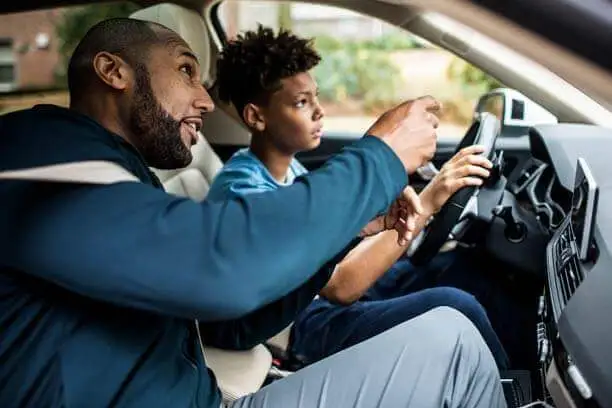How to Teach Your Tween Safe Driving Skills — Before Driver’s Ed


Your child is getting close to being behind the wheel. As a parent, this is both exciting and nerve-wracking. Before they hit the road, or even start driver’s ed, there are driving skills you can teach them that can make them safer drivers.
Well before your child is ready to hit the road, you can teach them good driving habits. Instilling these responsible driving habits when kids are young can help them better understand the rules of the road when it comes to teaching your child how to drive.
You might be wondering to yourself how am I going to teach driving habits, and good ones at that? Well, we’ve got a list here of helpful tips you can utilize when it comes time to educate your child.
It can be easy to have snap reactions to other drivers or hazards on the road with you. When you have kids in the car, it’s important to lead by example and model good driving behaviors. Chances are your children are being influenced by you and your driving habits. Demonstrating good driving habits, such as defensive driving, early on will help them once they begin driving themselves.
Before your children can get behind the wheel, they’ll have to prove they know the rules of the road. They will learn these rules in drivers’ education, but you can begin sooner than that. You can start from an early age, teaching them what road signs mean, how stoplights and speed limits work and other driving etiquette rules.
The best way to make sure your child is a good driver is to be a good coach. When you’ve got your children in the car with you, it doesn't hurt to explain what’s going on while you’re driving. Simple and meaningful interactions like these encourage your child to talk more and use new words. Introducing your child to driving maneuvers like merging, using a blinker, turning on your headlights or what green, yellow and red mean at a stoplight can have underlying value for them later in life.
Of course, safety is of the utmost importance when getting behind the wheel of any vehicle. Encouraging your children to practice safe behaviors in the car can start when they’re the passenger. Something as simple as putting on your seat belt, no matter how far you’re traveling, can be the difference should you find yourself in an accident. Additionally, staying alert while driving and avoiding distractions can encourage your children to be safe in the car.
Being alert is the most important skill a driver can develop. In 2021, distracted driving claimed the lives of over 3,000 people. When we get in the car, we have habits that we do while driving. For even the most skilled and experienced, driving distractions can cost you. When preparing your tween to drive, consider addressing the different types of distractions, including adjusting the radio or climate, texting a friend or speeding.
Another conversation to have with your tween before they get their license is about responsible car ownership. Regular car maintenance can lead to a longer lifespan for your vehicle. While you don’t have to be an expert in mechanics, here’s an easy-to-follow list of maintenance tasks to keep in mind and go over with your child. Without regular checkups, your tween’s car may run into preventative issues. Avoid these car maintenance mistakes and discuss the importance of responsible car ownership.
It can be nerve-wracking letting your child get behind the wheel. Teaching them good driving practices before they begin driving can help keep them safer on the road. Before your tween gets their license, talk with your local Farm Bureau agent to make sure they’re properly covered and to discuss discounts available for good driving.